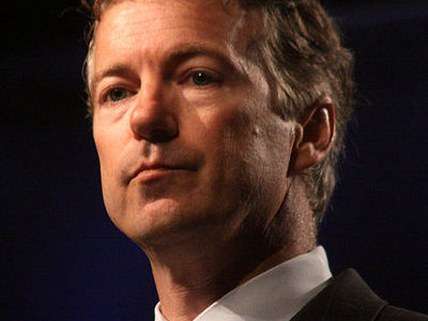Return of the Anti-War Right
Sen. Rand Paul is among those insisting on a less aggressive approach to foreign policy.

In the February 1987 issue of reason, Bill Kauffman wrote about the history of the "anti-war capitalists," explaining that while this cohort of activists did not look like the kind of protesters that were most prominent in the "peace movement" of the 1960s, '70s, and even '80s, they could trace their intellectual roots through a long tradition of libertarian anti-war thinking. Kauffman explained that before the era of the left-wing peace movement, opponents of war were "midwestern industrialists and retired military officers, publishing giants and Texas oilmen, or minerals executives and Great Plains farmers."
That such people once dominated the anti-war movement, Kauffman noted, was "an inconvenient fact that has been consigned to the memory hole by left and right alike." Non-intervention, wrote Kauffman, had become part and parcel of a "grand mosaic of socialism, ecologism, holistic feminism, etc.," ideas that might turn off the majority of ordinary Americans who had, in Kauffman's view, retained a distinctly Jeffersonian view of foreign policy and non-intervention.
Today, the idea of non-interventionism has re-entered the mainstream, in part because of the growing influence of libertarianism in American politics. An April Wall Street Journal/NBC News poll found 47 percent of Americans say the U.S. should become "less active" in global affairs and only 19 percent want the U.S. to be "more active," a mirror image of the results of a similar poll taken in 2001. War weariness helped Barack Obama become president in 2008. And it may have contributed to his victory over the more openly interventionist Mitt Romney in 2012. American war-weariness arguably also helped keep the U.S. out of a military conflagration in Syria for which neoconservatives and liberal interventionists were pushing.
Anti-war sentiment has made inroads again on the right, which for years has been dominated by hawks. Sen. Rand Paul (Ky.), who has consistently polled near the top of the list of potential 2016 Republican candidates, has made a name for himself in part by insisting on a less aggressive approach to foreign policy, much as his father, former congressman and presidential candidate Ron Paul, did before him. Republicans are even beginning to rethink Iraq: In a February poll by the Pew Research Center, only 36 percent said they believed that America achieved its objectives during the war in that country.


Show Comments (119)